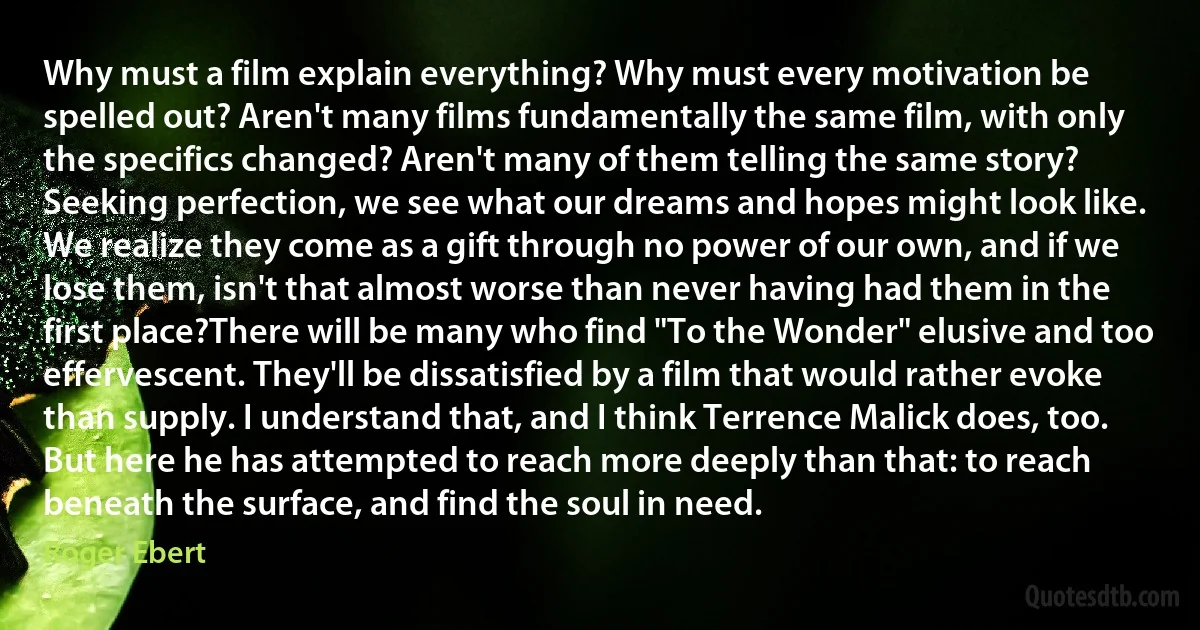
Why must a film explain everything? Why must every motivation be spelled out? Aren't many films fundamentally the same film, with only the specifics changed? Aren't many of them telling the same story? Seeking perfection, we see what our dreams and hopes might look like. We realize they come as a gift through no power of our own, and if we lose them, isn't that almost worse than never having had them in the first place?There will be many who find "To the Wonder" elusive and too effervescent. They'll be dissatisfied by a film that would rather evoke than supply. I understand that, and I think Terrence Malick does, too. But here he has attempted to reach more deeply than that: to reach beneath the surface, and find the soul in need.
Roger EbertRelated topics
almost everything film find gift having lose might need place power reach see seeking soul story surface telling think wonder worseRelated quotes
It's funny how one summer can change everything. It must be something about the heat and the smell of chlorine, fresh-cut grass and honeysuckle, asphalt sizzling after late-day thunderstorms, the steam rising while everything drips around it. Something about long, lazy days and whirring air conditioners and bright plastic flip-flops from the drugstore thwacking down the street. Something about fall being so close, another year, another Christmas, another beginning. So much in one summer, stirring up like the storms that crest at the end of each day, blowing out all the heat and dirt to leave everything gasping and cool. Everyone can reach back to one summer and lay a finger to it, finding the exact point when everything changed. That summer was mine.

Sarah Dessen
My retainers keep me on ice. Dry ice. It slows my metabolism, takes the edge off my appetite, slightly. I lie, bound with heavy chains, between two great slabs of it, naked and sweating, trying to sleep through the torment of a summer's day.
They've given me the local fall-out shelter, the very deepest room they could find, as I requested. Yet my senses move easily through the earth and to the surface, out across the lazy, warm suburbs, restless emissaries skimming the sun-soaked streets. If I could rein them in I would, but the instinct that drives them is a force unto itself, a necessary consequence of what I am and the reason I was brought into being.
Being, I have discovered, has certain disadvantages. I intend seeking compensation, just as soon as the time is right.

Greg Egan
One world and then another, running like a chain. One world treading on the heels of another world that plodded just ahead. One world's tomorrow, another world's today. And yesterday is tomorrow, and tomorrow is the past.
Except, there wasn't any past. No past, that was, except the figment of remembrance that flitted like a night-winged thing in the shadow of one's mind. No past that one could reach. No pictures painted on the wall of time. No film that one could run backwards and see what-once-had-been...
One road was open, but another road was closed. Not closed, of course, for it had never been. For there wasn't any past, there never had been any, there wasn't room for one. Where there should have been a past there was another world.

Clifford D. Simak
Robert Hughes (Labour MP for Aberdeen North): With regard to the Prime Minister's desire for a classless society and social mobility, will he explain why there are no women in his Cabinet, or is the only woman in his Cabinet the back-seat driver?
John Major: In recent years, in all aspects of life in this country, women have been taking a higher profile: in the law, in commerce, in the civil service, in industry and in politics - and that will continue. As those women would wish it to be, they will reach the top on merit - oh yes, and if the hon. Gentleman is patient, he will find women aplenty in top positions in my Government. Indeed, if he had waited awhile, perhaps even to the end of today, he would not have asked that question.

John Major
It is one of the most beautiful characteristics of Theosophy that it gives back to people in a more rational form everything which was really useful and helpful to them in the religions which they have outgrown... in this teaching as to the immortality of the soul and the life after death, Theosophy...does not put forward these great truths merely on the authority of some sacred book of long ago; in speaking of these subjects it is not dealing with pious opinions, or metaphysical speculations, but with solid, definite facts, as real and as close to us as the air we breathe or the houses we live in - facts of which many among us have constant experience - facts among which lies the daily work of some of our students, as will presently be seen.

Charles Webster Leadbeater
